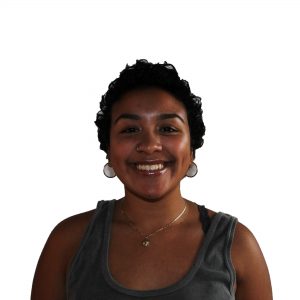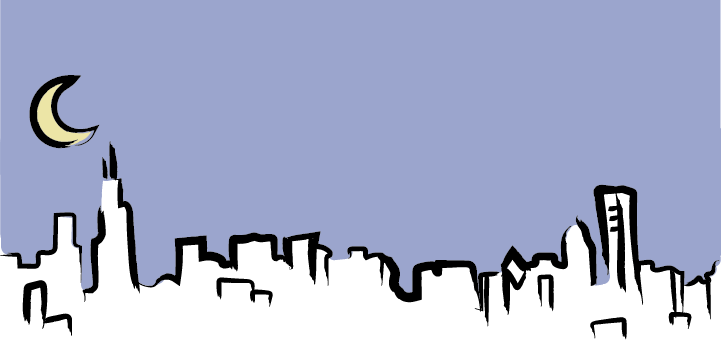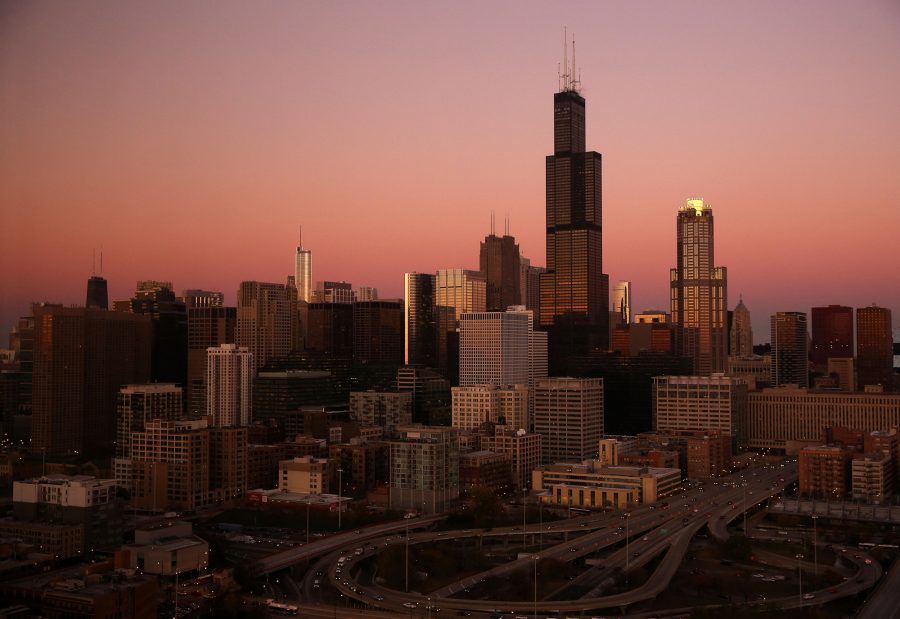Keep Chicago out of your mouth
Brian Cassella (Chicago Tribune)
The sun sets upon the Chicago skyline in November 2013. Illini Fest attracted Chicago-based University alumni on July 18 with nostalgia-inducing exhibits.
October 16, 2016

At the University, Chicagoans are constantly on their guard, ready to combat any negativity directed toward the city.
The general consensus is that if you’re not from the city and you have something bad to say, keep the city’s name out of your mouth.
This sentiment reigned true while Chicagoans watched both presidential debates. People from the city took their thoughts to social media, groaning in agony whenever Republican presidential candidate Donald Trump would refer to Chicago when speaking on violence in “the inner cities.”
However, this is hardly the first time Trump has had Chicago’s name in his mouth.
In fact, NBC found that Trump has actually referred to the violence specifically in Chicago more than 42 times since July. Additionally, the Republican candidate told Fox News Channel’s Bill O’Reilly that he was able to meet with a “top Chicago police officer” who allegedly told Trump that the violence would be gone “in a week” if the Chicago Police Department (CPD) used tougher tactics.
Get The Daily Illini in your inbox!
But the CPD debunked the claim, saying, “No one in the senior command at CPD has ever met with Donald Trump or a member of his campaign.”
Though the claim was proven false, the fact that Trump made, and continues to make, such exaggerated claims causes citizens to imagine what the future of the U.S. would look like should he become president.
In the first presidential debate, Trump lionized the unconstitutional “stop-and-frisk program” of New York City, insisting that it was effective and generally “good.” But the fact that that “stop-and-frisk” policy only resulted in racial profiling, and an even larger disconnect between the people and the police, tells us otherwise.
But despite Trump’s plans for the presidency, his words can offer some insight into how Chicago’s violence is often misrepresented and misunderstood. For one, Chicago is constantly defined by its violence because of the media.
Freshman and south side Chicagoan Nicole Jourdain says that she often hears students at the University refer to the city in a negative way.
Freshman Alex Aguilera added on that, while the issue is pressing, it isn’t “Just on the south side. Violence occurs downtown as well and I hate how the issue is focused on just black (people) or Latinos when the violence is everywhere.”
But while the issue of violence is definitely pressing and growing, the media is doing nothing to help the city heal. There is nowhere near as much media coverage on the things that the citizens are doing to combat this issue than on the negativity.
Jourdain and Aguilera brought Project Orange Tree to my attention. According to the Chicago Sun-Times, Project Orange Tree was started by the friends of Hadiya Pendleton, a 15-year-old King College Prep student who was killed due to gun violence.
The anti-violence project spread nationally and eventually gained the support of many similar groups as well as major corporations. While I definitely remember hearing about Pendleton’s death, I only recall hearing about the project briefly in the news.
This is not uncommon. The citizens of Chicago are constantly holding marches and rallies, creating programs and clubs, and expressing their dissatisfaction with the violence in the city. The media just doesn’t think that that side of the story is worthy of being covered.
Due to this, the citizens of Chicago are often perceived as being stagnant toward this issue. And because the majority of the violence occurs in neighborhoods with a majority of black or Latinx populations, people of color are often blamed for the violence that occurs in their communities, as if they brought it upon themselves.
Freshman Hyde Park resident Isaiah Reynolds says, “It’s easy to associate something negative with a group of people that have so many stereotypes against them in the first place.”
What’s arguably worse is that the rest of the nation jokes about this issue. From posts on social media to celebrating the word “Chiraq” — a word that disturbingly parallels the violence of Chicago to the casualties of the war in Iraq — the pain of Chicagoans seems to be a source of inspiration for the most distasteful comedy.
In my own life, I have only heard the word “Chiraq“ being used by people who aren’t from the city, or in songs. Typically, the word isn’t embraced by the city’s youth as much as it is by those on the outside looking in.
“Because Chicago is the center for whatever is cool in Illinois, people who haven’t been there will say it (Chiraq) because they see the violence all over TV and hear (Chiraq) once and think that it’s cool,” says Reynolds. “But nobody in Chicago uses that word. There’s a common understanding that we don’t want to continue that idea of violence.”
“Chiraq” is meant to desensitize people to the violence by glorifying it instead. But when you’re actually from there, and you know the pain that our communities of color face, these jokes aren’t so funny.
When you tell somebody that you are from Chicago, and they jokingly ask you if “you’ve known anybody who has been shot,” you have to decide whether or not you should answer honestly.
It isn’t a medal of honor to have lost someone to the violence, to live in neighborhoods where you fear for your life at times. I am privileged enough to have not lived in areas where the violence is prevalent. But every day, my friends, my family, maybe even myself, could become victims of this unsolved issue.
“Saying that I’m from Chicago (at the University), I usually get people saying ‘Chiraq’ all the time,” says Reynolds. “It makes me uncomfortable.”
Aguilera chimed in, noting his frustrations with how he understands that while the issue of violence is critical, he hates how “it clouds other things that happen in the city.”
At the core, Chicago’s violence irritates us all. Politicians have the power to do something about it, such as making decisions about gun control and the widening economic gap — decisions which would definitely affect the violence.
But the least outsiders can do is have some class instead of disrespecting the many lives the city has lost.
Tatiana is a freshman in Media.








